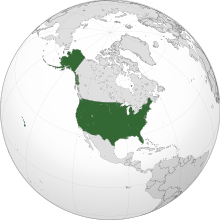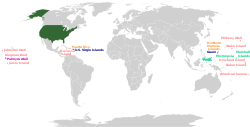The United States of America, commonly known as the United States (U.S. or USA), is a country primarily located in North America. It is a federal republic of 50 states, a federal capital district (Washington, D.C.), and several territories.
The U.S. accounts for about 25% of the global economy and 30% of global wealth, with the world’s largest nominal GDP. The country is home to globally important industries in aerospace, defense, automobiles, energy, entertainment, finance, healthcare, and information technology. The U.S. is a founding member of several international organizations, including the United Nations, NATO, and the World Bank.
The history of the United States began with the arrival of the first people in the Americas around 15,000 BC. European colonization started in the late 15th century, and by the 1760s, the thirteen British colonies contained 2.5 million people.
The American Revolutionary War (1775–83) led to the independence of the United States, which was internationally recognized by the Treaty of Paris (1783). The U.S. Constitution was adopted in 1789, establishing a federal government with three separate branches: legislative, executive, and judicial.
The United States has a diverse population and is known for its cultural and technological influence on the world. It has a very high Human Development Index (HDI) and is a major political and economic force globally. The country has a rich history shaped by various events, including westward expansion, the Civil War, industrialization, and social movements.
The U.S. has been led by prominent figures such as George Washington, Thomas Jefferson, Abraham Lincoln, Franklin D. Roosevelt, and many others. It has played a significant role in world affairs, including both World Wars and the Cold War. The nation’s history is marked by achievements and challenges, including issues related to slavery, civil rights, immigration, and foreign policy.
In summary, the United States is a prominent global power with a rich history and diverse culture. Its influence extends across various domains, including politics, economics, technology, and entertainment.
For more detailed information, you can refer to the Wikipedia pages “United States” and “History of the United States.”
Citations:
https://en.wikipedia.org/wiki/United_States
The United States of America (USA), commonly known as the United States (U.S.) or America, is a country primarily located in North America. It is a federal union of 50 states and a federal capital district, Washington, D.C. The 48 contiguous states border Canada to the north and Mexico to the south, with the states of Alaska to the northwest and the archipelagic Hawaii in the Pacific Ocean. The United States also asserts sovereignty over five major island territories and various uninhabited islands. The country has the world's third-largest land area, largest exclusive economic zone, and third-largest population, exceeding 334 million. Its three largest metropolitan areas are New York, Los Angeles, and Chicago, and its three most populous states are California, Texas, and Florida.
United States of America | |
|---|---|
| Motto: "In God We Trust" Other traditional mottos:
| |
| Anthem: "The Star-Spangled Banner" | |
| Capital | Washington, D.C. 38°53′N 77°1′W / 38.883°N 77.017°W |
| Largest city | New York City 40°43′N 74°0′W / 40.717°N 74.000°W |
| Official languages | None at the federal level |
| National language | English |
| Ethnic groups (2020) | By race:
By origin:
|
| Religion (2023) |
|
| Demonym(s) | American |
| Government | Federal presidential republic |
| Joe Biden | |
| Kamala Harris | |
| Mike Johnson | |
| John Roberts | |
| Legislature | Congress |
| Senate | |
| House of Representatives | |
| Independence from Great Britain | |
| July 4, 1776 | |
| March 1, 1781 | |
| September 3, 1783 | |
| June 21, 1788 | |
| Area | |
• Total area | 3,796,742 sq mi (9,833,520 km2) (3rd) |
• Water (%) | 7.0 (2010) |
• Land area | 3,531,905 sq mi (9,147,590 km2) (3rd) |
| Population | |
• 2023 estimate | |
• 2020 census | |
• Density | 87/sq mi (33.6/km2) (185th) |
| GDP (PPP) | 2024 estimate |
• Total | |
• Per capita | |
| GDP (nominal) | 2024 estimate |
• Total | |
• Per capita | |
| Gini (2022) | medium inequality |
| HDI (2022) | very high (20th) |
| Currency | U.S. dollar ($) (USD) |
| Time zone | UTC−4 to −12, +10, +11 |
• Summer (DST) | UTC−4 to −10 |
| Date format | mm/dd/yyyy |
| Drives on | right |
| Calling code | +1 |
| ISO 3166 code | US |
| Internet TLD | .us |
Paleo-Indians migrated across the Bering land bridge more than 12,000 years ago, and went on to form various civilizations and societies. British colonization led to the first settlement of the Thirteen Colonies in Virginia in 1607. Clashes with the British Crown over taxation and political representation sparked the American Revolution, with the Second Continental Congress formally declaring independence on July 4, 1776. Following its victory in the 1775–1783 Revolutionary War, the country continued to expand across North America. As more states were admitted, a North-South division over slavery led to the secession of the Confederate States of America, which fought the remaining Union states in the 1861–1865 American Civil War. With the Union's victory and preservation, slavery was abolished nationally. By 1900, the U.S. had established itself as a great power, which was solidified after its involvement in World War I. After Japan's attack on Pearl Harbor in December 1941, the U.S. entered World War II. Its aftermath left the U.S. and the Soviet Union as the world's two superpowers and led to the Cold War, during which both countries engaged in a struggle for ideological dominance and international influence. Following the Soviet Union's collapse and the end of the Cold War in 1991, the U.S. emerged as the world's sole superpower, wielding significant geopolitical influence globally.
The U.S. national government is a presidential constitutional federal republic and liberal democracy with three separate branches: legislative, executive, and judicial. It has a bicameral national legislature composed of the House of Representatives, a lower house based on population; and the Senate, an upper house based on equal representation for each state. Substantial autonomy is provided by federalism, with a political culture promoting liberty, equality, individualism, personal autonomy, and limited government.
One of the world's most developed countries, the United States has had the largest nominal GDP since about 1890 and accounted for over 15% of the global economy in 2023. It possesses by far the largest amount of wealth of any country and has the highest disposable household income per capita among OECD countries. The U.S. ranks among the world's highest in economic competitiveness, productivity, innovation, human rights, and higher education. Its hard power and cultural influence have a global reach. The U.S. is a founding member of the World Bank, Organization of American States, NATO, and United Nations, as well as a permanent member of the UN Security Council.




